Credit growth picks up:Wider interest margins lift bank earnings, but problem loans creep higher.
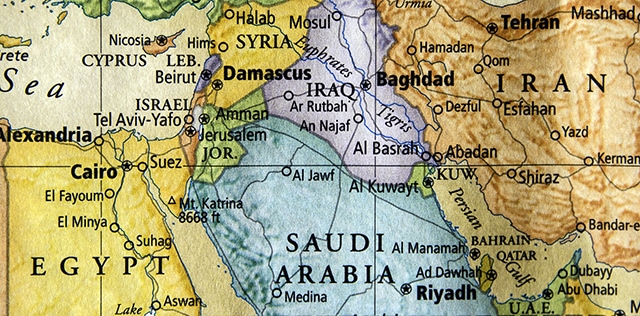
With many regional currencies pegged to the dollar, interest rates are on the rise across the Middle East in tandem with moves by the US Federal Reserve. Wider interest margins, combined with a gradual pickup in credit growth, are enabling banks in the region to remain broadly profitable, even as problem loans rise modestly.
Saudi Arabia’s banks, which have the highest levels of provisioning coverage in the Gulf Cooperation Council (GCC) countries, are expected to outperform their peers. “Liquidity and funding will remain solid against a backdrop of limited credit growth,” says Olivier Panis, senior credit officer at Moody’s Investors Service Middle East in the Dubai International Financial Center. “Sovereign debt issues will boost public-sector deposits, although private-sector deposit growth will remain low,” Panis says.
In the United Arab Emirates (UAE), liquidity conditions have improved, credit demand is rising and banks may be more prepared to lend, says Daniel Kaye, head of macroeconomic research at National Bank of Kuwait. “The [UAE] banking system now looks better adjusted to the new, lower-oil-price climate and could become more supportive of economic growth this year,” he says. Lending to the UAE construction sector remains robust, helped by project-related activity ahead of Dubai’s Expo 2020 and the rising supply of new property developments, Kaye says.
Jordan-based Arab Bank, which has the most extensive banking network in the Arab world, is Global Finance’s overall winner in the Middle East region and the country winner in both Jordan and Yemen. The bank’s historical presence and deep understanding of the region, its conservative risk appetite and its diversified income streams have all contributed to its healthy profitability in recent years. Last year’s earnings of $533 million were up only slightly from the year before. However, excluding the effect of the devaluations of a number of Arab and foreign currencies, the group’s net profit grew by 8%.
Arab Bank has maintained its policy of minimum reserve coverage of 100%, with no increase in nonperforming loans (NPLs) last year. The bank is well capitalized, with a capital adequacy ratio of 15.3% at the end of 2017, as calculated in accordance with Basel III regulations. CEO Nemeh Sabbagh says, “The solid results of Arab Bank Group for 2017 were driven by sustainable growth in the underlying business, spread improvements and well-controlled expenses.”
While Arab Bank has a dominant presence in its home market, it receives 72% of its revenue from outside Jordan. The bank’s global network of more than 600 branches on five continents enables it to support local companies as they operate throughout the world. At the same time, Arab Bank is a gateway to Middle East markets for multinational companies. The bank maintains a global network of treasury centers to serve corporate customers. At the same time, Arab Bank is increasing its focus on providing loans to small and medium enterprises (SMEs), supporting economic growth and development in the 27 countries where it is present.
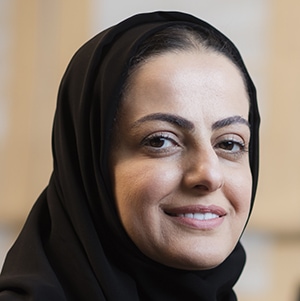
Rania Mahmoud Nashar, Samba Financial Group CEO |
The corporate- and investment-banking business of Arab Bank has supported major projects throughout the Middle East with its lending and complex-structured-finance facilities. At home, the bank is collaborating with multinational financial institutions on financing renewable-energy projects in Jordan—helping to lessen the country’s dependence on imported fuel for power generation.
In the important Saudi Arabian market, Samba Financial Group is Global Finance’s selection for best bank, due to its resilience in the economic downturn and its ability to deliver strong financial results while keeping expenses well controlled.
Samba’s corporate-banking group serves more than 2,000 Saudi companies, offering Islamic banking, debt advisory, loan syndications, project finance, cash management, risk-management solutions, trade finance and electronic banking. Samba’s strong balance sheet enables it to support large-scale financing and to take lead roles in major structured and syndicated deals. The bank serves 90% of the top-100 Saudi companies.
SambaCapital is the leading equity-capital market franchise in the kingdom. It is also the leading financial advisor on mergers and acquisitions, restructurings, expansions and capital structuring. Samba also has been an active lead manager, placement agent and arranger of sukuk in Saudi Arabia.
Rania Mahmoud Nashar, managing director and CEO of Samba Financial Group, says: “Undoubtedly, Samba’s selection for this award underscores the strength and excellence of the group and the premier position it has maintained in a promising market like Saudi Arabia. This is a source of pride to all Samba staff, and prompts the group to maintain this highly appreciated position. We are fully aware of the extent of competition in the local market of this vital banking and financial industry. Samba has the expertise, know-how, high potential, broad network and strategic vision that enable it to move forward, continue its growth and build over its solid base of achievements.”
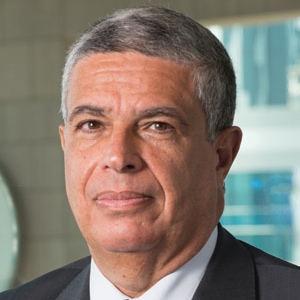
Adel El-Labban, Ahli United Bank CEO |
Global Finance selected Ahli United Bank (AUB) as the Best Bank in Bahrain, due to its well-managed business model based on regional diversification and cross-border flows. AUB’s earnings rose 8.4% last year to $619 million. The bank’s NPL ratio was contained at 2.4%, and the return on equity was 16.7%.
AUB has both onshore and offshore operations in Bahrain. It also operates in Kuwait, the UAE, Egypt, Iraq, Oman and Libya, and has a UK subsidiary.
Adel A. El-Labban, group CEO and managing director of AUB, says, “The record 2017 results were underpinned by application of a prudent risk framework, effective asset-liability management and judicious cost controls.”
National Bank of Kuwait (NBK) has a strong presence in most regional markets and a large share of the banking industry’s profits in its home country. NBK remains among the highest-rated banks in the Middle East and made Global Finance’s list of the 50 safest banks in the world in each of the last 12 years.
Within the GCC countries, NBK also operates in Abu Dhabi, Bahrain, Dubai and Jeddah, Saudi Arabia. NBK Egypt has 41 branches, two of which are shariah compliant. NBK operates in Iraq through its Credit Bank of Iraq subsidiary. It also has a small network in Lebanon and Jordan.
NBK is the leading project-finance bank in Kuwait under the country’s economic-development plan. It plans to open two new branches in Saudi Arabia this year, focused on asset management and private banking.
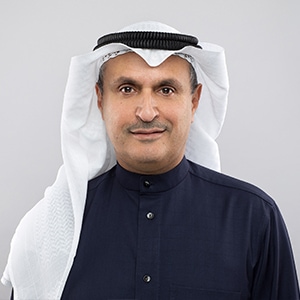
Isam Al Sager,NBK Kuwait group CEO |
Isam Jasem Al Sager, group CEO of NBK, says: “NBK remains the country’s top-performing banking group, with a market-leading position domestically that provides a stable foundation for our growth strategy to build upon. NBK is a highly diversified banking group, by geography and by line of business, and is uniquely placed to compete in both conventional banking and Islamic banking. The group follows a policy of investing heavily in enabling technologies and innovative solutions that increase market competitiveness, customer satisfaction and operational efficiency.”
Meanwhile, Qatar’s banks came under pressure immediately after some of its Arab neighbors, led by Saudi Arabia, imposed a blockade of the country in June 2017. “Qatar’s banking sector has weathered the worst of the impact of the blockade,” says Jason Tuvey, Middle East economist at Capital Economics. “But tight external-financing conditions and a need to deleverage mean that credit growth will provide less of a prop to the economy than it has done over the past decade,” he says.
Commercial Bank of Qatar, a private-sector bank, posted a 20.4% rise in earnings last year. The bank handles more than 40% of all salaried accounts in Qatar and has the country’s leading mobile-banking app. Commercial Bank’s assets rose 6.2% last year to $38 billion.
The bank brought its transaction-banking operational services back onshore from India in 2017. Commercial Bank offers a one-minute online remittance service to India, Sri Lanka and the Philippines.
Commercial Bank’s Turkish subsidiary, Alternatifbank, entered into a strategic partnership with National Bank of Oman, the second-largest bank in Oman, in which Commercial Bank holds a 34.9% stake. Commercial Bank is negotiating the potential sale of its 40% stake in United Arab Bank (UAE).
First Abu Dhabi Bank (FAB) is our choice for Best Bank in the United Arab Emirates. FAB was recognized by Global Finance as the Safest Bank in the Middle East in 2017 and the only bank in the region to hold three ratings in the AA range. The bank was created through the March 2017 merger of National Bank of Abu Dhabi and First Gulf Bank, becoming the biggest bank in the UAE, with $182 billion in assets at the end of last year.
FAB led the GCC loan league tables last year with a 14.3% market share. It has an NPL ratio of 3% and provision coverage of 109%. FAB has a 16.7% Tier 1 capital ratio. It is present in 19 countries outside of the UAE.
Bank Hapoalim, Israel’s largest bank, with 230 retail branches, is leading innovation in the country’s banking sector. It introduced the first peer-to-peer application of its kind, known as Bit. It is also partnering with Israel’s leading technology institute, the Technion.
Bank Hapoalim’s total problem loans declined by 10% in 2017, with an NPL ratio of 0.75%, down from 1.27% a year earlier. Its Tier 1 capital ratio was 11.26%.
Arik Pinto, president and CEO of Bank Hapoalim, said in the bank’s announcement of its 2017 results, “Accelerated growth continued in our commercial banking business, with successful opening of new banking centers serving small and mid-sized business clients.” He added, “We improved the quality of our credit portfolio in the area of large corporate clients while building infrastructures for significant growth in financing of corporate clients and leadership in financing the major projects in the Israeli economy.”
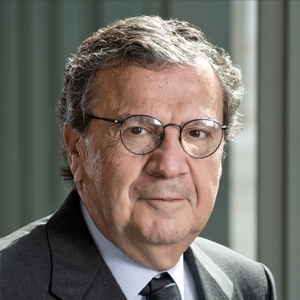
Samir Hanna, Bank Audi CEO |
In neighboring Lebanon, Bank Audi, the leading bank in terms of assets, deposits, loans and equity, is Global Finance’s choice for best bank. Samir Hanna, Bank Audi group CEO, says: “We are pleased to be awarded Best Bank in Lebanon again. We believe the bank’s performance in 2017 strengthened the group’s financial standing, reinforced its financial flexibility, sustained its profitability in spite of tough operating conditions, and reinforced the group’s leading position in the domestic market and among major regional banking groups at large.”
Bank Audi has a presence in 11 countries. Its earnings rose 13% last year, with 45% of the total coming from outside of Lebanon. Earnings of Bank Audi’s Turkish subsidiary, Odea Bank, rose by 29%. The ratio of doubtful loans was 3% for Bank Audi Lebanon, 1.5% for Bank Audi Egypt and 4.7% for Odea Bank. Bank Audi’s return on average common equity was 13.4% in 2017.
Bank Audi Egypt completed the implementation of a capital-markets solution in 2017, while Odea Bank enhanced its treasury-trading solution to improve its efficiency. The group worked to modernize its core banking systems and Bank Audi Lebanon expects to introduce a new core system toward the end of this year.
Our winner in Palestine is Bank of Palestine, which is constantly growing and becoming more inclusive. The bank has the most-widespread branch network in Palestine, with 72 branches, and a representative office at the Dubai International Financial Center. It opened a second rep office in Santiago, Chile, last year to serve Palestinians living in Chile and Chileans of Palestinian descent, with populations estimated at 350,000 and 500,000, respectively.
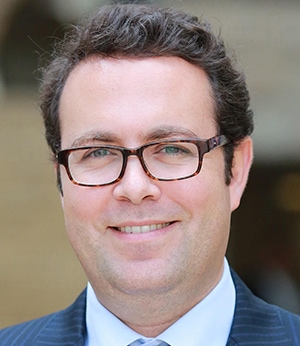
Hashim Shawa, Bank of Palestine Chairman and General Manager |
The bank owns PalPay, a fintech company providing electronic-payment solutions serving the 50% of the Palestinian population that is still unbanked. PalPay continued to sign agreements with additional utility companies in Palestine last year to enable clients to pay their bills through the system.
With youth unemployment at 50%, and with entrepreneurs lacking access to early-stage financing, Bank of Palestine and several partners have established the $10.4 million Ibtikar Fund to invest in technology start-ups.
Commercial International Bank (CIB), Egypt’s largest private-sector bank, is Global Finance’s choice as the Best Bank in Egypt because of its strong financials and its work in promoting the country’s economic development. CIB financed several major government projects last year, including two syndications to finance the upgrade of Egypt’s national electricity grid. CIB also focused on building strategic alliances with government agencies on projects such as the Suez Canal Industrial Zone and the New Capital City project, which represent potential markets for its products and services.
Hisham Ezz Al-Arab, chairman and managing director of CIB, says: “We are proud to have won this award. Such achievement not only positions CIB in the forefront, but also serves as a testament to the stability of the Egyptian banking sector and affirms its positive economic-development plans. We continue to focus on making necessary investments and adopting the latest technologies to further enhance our leadership.”
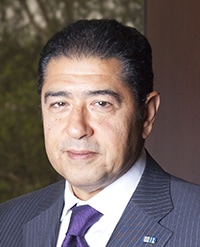
Hisham Ezz Al-Arab, CIB Chairman and Managing Director |
CIB’s earnings rose 25% last year and its return on equity was 32.5%. The treasury group is one of the top profit centers for the bank. In addition, CIB leads in Egypt’s payment-acceptance sector, with 12,000 point-of-sale terminals.
Throughout the Middle East, the leading banks are adopting global best practices, introducing cutting-edge technology and designing new products and services. In Oman, Bank Muscat, the country’s largest bank, with the leading corporate franchise, is Global Finance’s selection for best bank. Bank Muscat is experienced in structuring large corporate deals. The bank completed $7.3 billion in investment-banking transactions last year, including the initial public offerings of Al Ahlia Insurance and Muscat City Desalination. It also was a joint lead manager of Oman’s first 30-year sovereign bond.
AbdulRazak Ali Issa, Bank Muscat’s chief executive, says: “Stemming from its flagship position in Oman, Bank Muscat delivers reliable, dynamic and innovative banking services. Driven by robust policies to achieve global best practices, the bank is focused on strategic initiatives to maintain growth momentum. The bank prides itself on its deep understanding of customer needs and adopts innovative strategies to achieve banking excellence. The customer-centric vision reflects the momentum for the next phase of development by offering simplified and integrated banking solutions to retain its competitive edge in the market.”
Bank Muscat’s Meethaq Islamic Banking is the leader in Oman’s Islamic-banking industry. It launched the country’s first sukuk program, as well as a portal for SMEs.
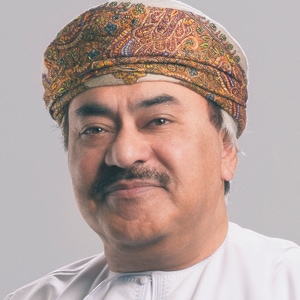
AbdulRazak Ali Issa, Bank Muscat CEO |
Bank Muscat’s bm Wallet, Oman’s first mobile wallet, demonstrated the bank’s lead in introducing an electronic-payment facility as part of the country’s eGovernment initiative.
Trade Bank of Iraq is Global Finance’s selection for Best Bank in Iraq. Since it was founded in 2003 to facilitate Iraq’s international trade and reconstruction, it has become the leader in providing banking services in the country. The bank plans to add more high-tech solutions following the introduction of a new core banking system in 2017.
Trade Bank of Iraq’s earnings rose 42.6% last year to $647 million, and its return on equity was 18.5%. The bank was a comanager last year in Iraq’s first independent bond sale in the global market in more than a decade. The $1 billion, 5.5-year bond was issued with a coupon of 6.75%.
Iraq’s economy is expected to continue its recovery this year, as reconstruction efforts begin following the defeat of ISIS. Iraq is the second-largest oil producer in OPEC.
Best Banks In The Middle East 2018
Regional Winner – Arab Bank
| Country | Bank |
|---|---|
| Bahrain |
Ahli United Bank |
| Eqypt |
Commercial International Bank |
| Iraq |
Trade Bank of Iraq |
| Israel |
Bank Hapoalim |
| Jordan |
Arab Bank |
| Kuwait |
National Bank of Kuwait |
| Lebanon |
Bank Audi |
| Oman |
Bank Muscat |
| Palestine |
Bank of Palestine |
| Qatar |
Commercial Bank of Qatar |
| Saudi Arabia |
Samba Financial Group |
| United Arab Emirates |
First Abu Dhabi Bank |
| Yemen |
Arab Bank Yemen |



